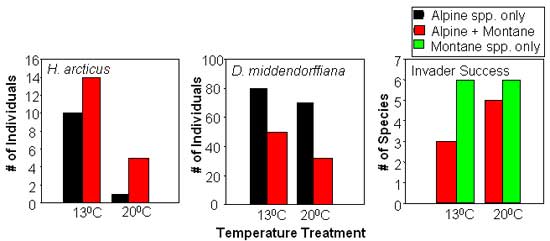 Alberta's WaterIntroductionPublications Climate Change Industrial Impacts Agricultural Impacts Urban Impacts Biodiversity Loss Definitions Links Site Map |
 |

Does Environmental Warming Increase Invasion of Alpine Zooplankton Communities by Montane Species?A 28-Day Warming Experiment The experiment used 18 aquaria at each of two temperatures, 13 °C and 20 °C. The hottest temperature corresponded with a modeled prediction of climate warming in mountain regions, and the colder temperature approximates an average summer day in an alpine lake. The three treatments were:
Preliminary results show that warming suppresses the predatory species H. arcticus, which facilitates colonization by montane species, but only if they can overcome dispersal barriers that preclude them from alpine lakes even though they appear to be able to thrive if placed into this type of environment. The herbivorous species D. middendorffiana, however, remains relatively unaffected. The findings suggest that climate warming may shift alpine zooplankton community structure towards daphnid species, which can affect ecosystem processes, such as primary production and food availability for higher tropic levels, such as fish. The figure below shows the number of individuals or species present in the warm and cold tanks, where spp is an abbreviation for species.  Preliminary Conclusions
Links |  |
 |  |